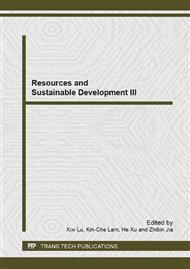p.1275
p.1279
p.1285
p.1289
p.1293
p.1303
p.1308
p.1314
p.1321
Calculation and Evaluation Methodology of Transport Energy Consumption and Carbon Emissions: A Case Study of Jiangsu Province
Abstract:
The calculation methodology of transport carbon emissions, based on the methodology recommended by Intergovernmental Panel on Climate Change (IPCC) and the energy consumption statistics of provincial transport industry in China, is proposed. By using the methodology, the energy consumption and carbon emissions of highway, waterway and urban passenger transport from 2005 to 2012 of Jiangsu Province are calculated and evaluated. And the developing trends and main features from the perspectives of the total amount of transport energy consumption and carbon emissions, the proportional of both various energy types and various transport modes in the energy consumption, the energy intensity and carbon dioxide intensity, are systematically analyzed. Finally, some policy implications of low-carbon transport development were conclusively put forward, including reducing energy intensity and carbon intensity as the core focus, the highway transport as the breakthrough point, optimizing the integrated transport system structure and developing of public transport in priority as the strategic orientation, developing clean and low-carbon energy as an important way, etc. The research methodology and results can provide references for decision-making and management of the relevant provinces and cities on low-carbon transport development.
Info:
Periodical:
Pages:
1293-1302
Citation:
Online since:
June 2014
Authors:
Price:
Сopyright:
© 2014 Trans Tech Publications Ltd. All Rights Reserved
Share:
Citation:


